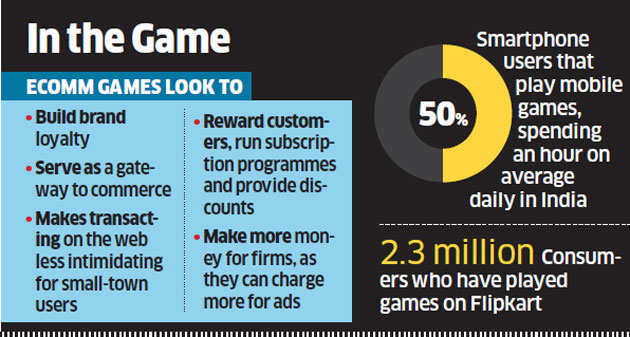 BENGALURU | MUMBAI: Games have become the new buzzwords on popular apps, with ecommerce companies such as Flipkart and Amazon, social media startups like ShareChat, and content aggregators like Dailyhunt introducing game elements, including contests and quizzes, to increase customer engagement.
BENGALURU | MUMBAI: Games have become the new buzzwords on popular apps, with ecommerce companies such as Flipkart and Amazon, social media startups like ShareChat, and content aggregators like Dailyhunt introducing game elements, including contests and quizzes, to increase customer engagement.The idea is to build brand loyalty and serve as a gateway to commerce, especially for first-time internet users from small towns.
High engagement products like games, local language interface and videos tend to build trust and familiarity with a brand, especially among customers who have recently come online, such as users in small towns who find transacting on the web an intimidating experience, companies say.
“Flipkart is primarily a shopping company, but the customers (who hail from smaller towns and cities), access a huge amount of video, gaming... we are therefore building these products for them to engage with us,” said Kalyan Krishnamurthy, group CEO, Flipkart.

The strategy has seemingly worked. Over 2.3 million consumers played games on the Flipkart platform, a day into the Big Billion Day sale on Sunday, the company said. As per a report by market research firm Kantar, 50% of smartphone users in India play mobile games, spending an hour on average daily.
Affordable smartphones and cheaper data plans in small towns and cities are aiding this process in an audience every consumer technology company is trying to capture, experts say.
“Gaming is one of the areas where customers love to engage with us, and eventually continue to shop with us,” Amit Agarwal, country head, Amazon India, said. Amazon has introduced games and contests to make customers engage with the platform better.
Apart from loyalty and engagement, these games are one way of rewarding customers, running subscription programmes and providing them with discounts.
Myntra, for instance, runs a free-toenroll membership programme called Myntra Insider. It asks customers to browse a line of products, play quizzes and crosswords to win points, which can be used as discounts either on the platform itself or merchants it has tied up with.
“After winning a tournament of some kind, the user can be given a currency (points), which can be used as a coupon code to avail discounts on products,” said Ashwin Suresh, cofounder, Pocket Aces, which runs a trivia game on local language news aggregator Dailyhunt.
For content companies, games drive viral content, engagement, and cost-effective monetisation.
“These companies spend huge marketing dollars on driving retention, a key metric for content startups. Gaming is an effective medium,” said an investor requesting anonymity.
As customers spend more time on an app playing games, apps get to charge more for advertisements. Advertisements are the next part of the plan, not only for startups like Dailyhunt and ShareChat, but also for established ecommerce companies.
No comments:
Post a Comment